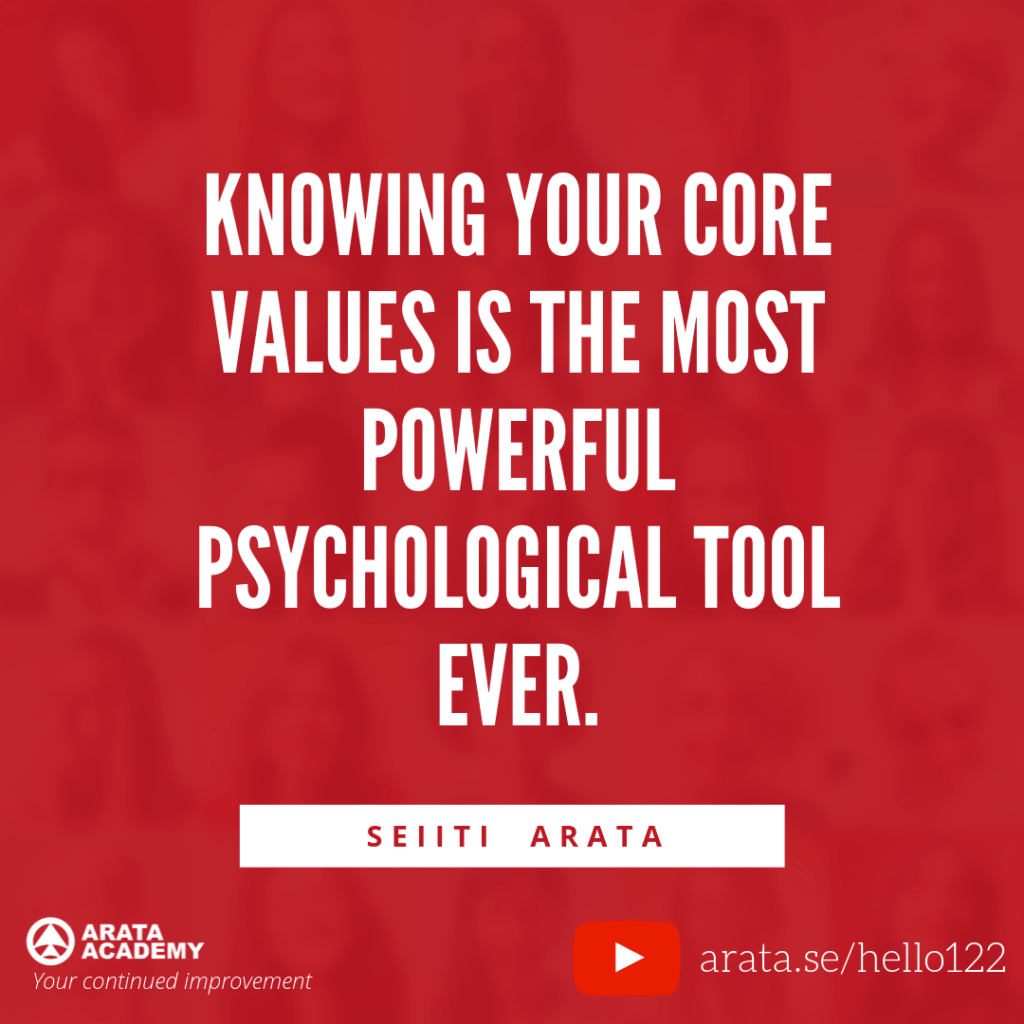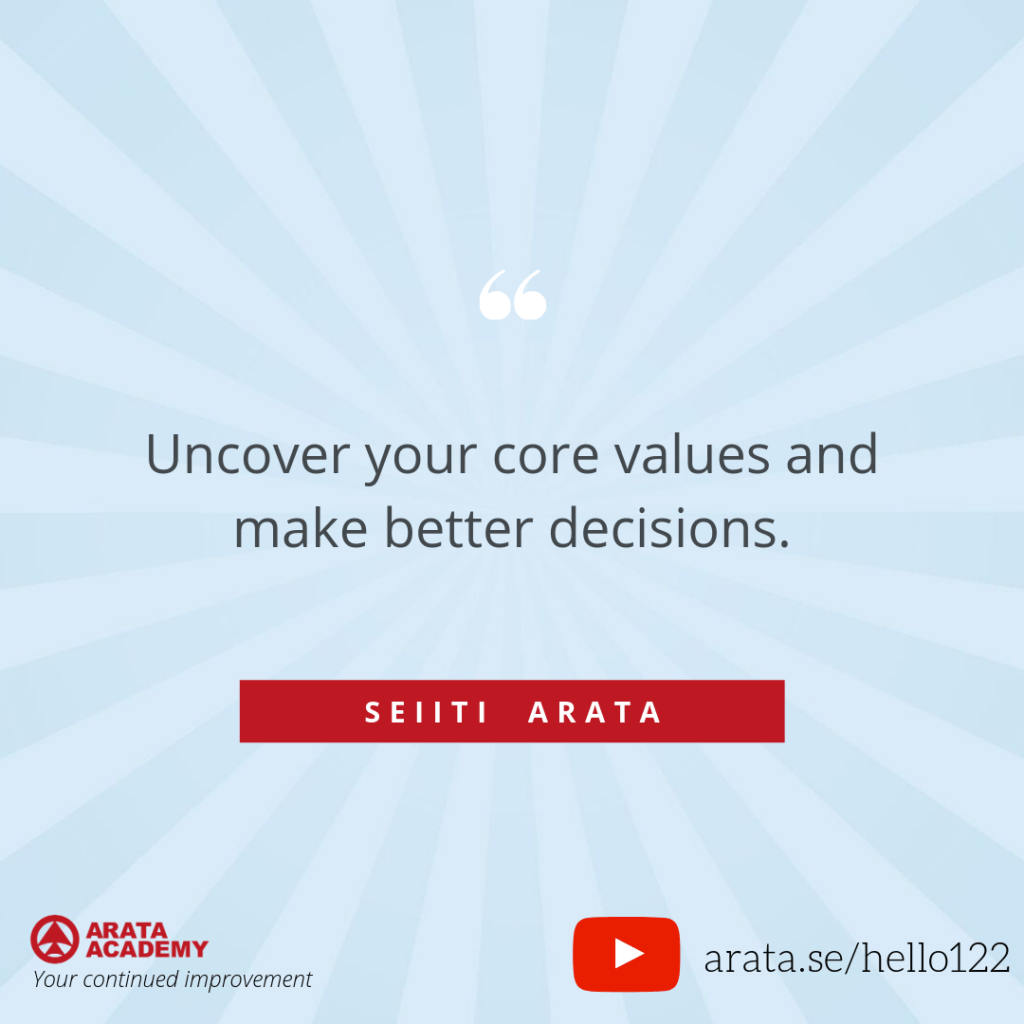Did you know that writing down your core values is scientifically proven to be one of the most effective psychological interventions?
A simple exercise like this has been proven to foster greater strength, control and pride in people. It also makes us more affectionate, tolerant and empathetic.
In the long run, knowing what you value most in life can also boost your study, reduce health problems and help you overcome challenges such as quitting smoking or drinking. All those benefits still stand for people who only write down their core values once, for ten minutes, and reap the rewards for months or even years to come.
That’s why you’ll find defining your core values in nearly every self-development or life planning resource.
The problem is that in most cases we’re taught to define our core values the wrong way. Usually, you’ll be told to take a piece a of paper and list what you value most in life, in order of importance. I gave this exercise to you recently because it is so simple to do.
But what’s the problem with this approach? Let me explain by giving you an example.
Imagine a situation where you’re faced with a decision. Why do you decide one way when another person makes a completely different decision?
Let’s say, for instance, that you’re offered a promotion to take on a directorial role in your company and that it entails moving city. The only problem is, your teenage son doesn’t want to move because he doesn’t want to be far from his new girlfriend.
What then? What do you do? Do you pass on the opportunity for professional growth because of your son’s relationship?

You might suspect that his teenage relationship won’t last very long. If you pass on the promotion, you might end up resenting your son for damaging your career because of a passing whim.
But the opposite may also be true. You might accept the promotion and force your son to move. And he’ll be the one resenting you for getting in the way of his relationship.
I don’t know which decision you’d make. But there’s one thing I’m sure of: different people will make different choices. And those choices are based on the values we have.
If we’re to follow the common teachings on core values, you’d only need to make a list ranking all your core values, and base your decision on that. So, for instance, if you listed the value “Career” above “Family”, then you’d logically take the director promotion. If you ranked them the other way around, you’d have to prioritize your son’s wishes over your career and give up on the promotion.
The problem is, real life isn’t as logical, as simple, as binary as that. If you decide to take the job and force your son to move, that doesn’t necessarily mean that you value your job more than your family.
Following our example, imagine that your declining the promotion leads your employers to lose trust in you, and eventually fire you, which would affect your family.
Life is way too complex to fit in a list on a piece of paper. In the decisions we have to make day to day there’s much more at stake than the duality of playing one value off another.
I’m not telling you that you don’t need to know and rank your core values. What I’m saying is, it’s much more interesting to see your core values not as a static list but as a sort of dynamic web.

In this web, all your values are interlinked. They’re dependent on each other, and their positions are constantly changing over time. And another thing: a lot of the time, those changes happen without you noticing, and other times for reasons you tell yourself, that aren’t necessarily true.
Let’s analyze each of those points.
1.Your values change depending on time and context.
The first step towards reaping the benefits of knowing what you value most is to understand the dynamic of values. To understand that your values aren’t fixed, or absolutes, but that they change over time and depending on context.
Picture this. You’re at a concert, in a messy venue, with a can of drink in your hand. There are hundreds of people around you, rubbish everywhere. The place is filthy and you can’t find the exit. In that context, no matter how much you value tidiness and cleanliness, how likely are you to throw your can on the ground?
Now imagine that you’re at a concert in a clean, tidy theatre. You’ve still got the same values, and you’re still holding a can. In this new context, how likely are you to throw the can on the ground?
You’ll notice I’m talking about the same person, with the same values. The only thing that changes is the context, the environment you’re in.
As well as context, another major influence to factor in to your values is time. Things you valued as a teenager probably aren’t that important to you anymore. And values you have today might not be that important to you a decade from now.
What I want to get across with these examples is that your core values are not a static list on a piece of paper. They are always changing, depending on where you are, who you live with, on your age, and your level of knowledge.
And values also influence one another. For instance, if you really value your family, you might start to value your health more after having a child. Because you’d want to live longer to be there every step of the way for the newest member of the family.
To better understand this dynamic, pay close attention to our second step…
2. You’re not always aware of your core values.
Once you’ve understood that your values change depending on your time of life and the context you’re in, you need to take a second step and admit that you’re not always aware of what you value most right now, in your current context, at your current age.
Most of the time, we’re not very aware of the values driving our decision-making.
And even if we’ve taken time out to write out our values on a piece of paper, it’s very difficult for us to rate each one of them to create a sort of algorithm to definitively determine the best possible choice.
I’ll say it again: values are not a static list of isolated elements. They’re part of a dynamic, interdependent web.
It’d be great if the teachings we found in most self-development resources worked as promised. All you’d have to do is make a list of what you value most and, for every decision you had to make in your life, you’d only need to compare one value with another to know what to do.
Unfortunately (or maybe not) , life is way more complex than that. Values only point us in a general, relative direction. That means that even if I have clarity on a given value, and know that it’s important to me, I can never be sure whether my actions or decisions will really bring me closer to that value.
I might even surprise myself when, having tried to value a certain area of my life, the consequences don’t bring about the expected outcome or even prevent it.

Let’s unpack this with another example. Imagine that I’ve listed health as one of my most important core values. So I decide to take up a sport where I end up having an accident that leaves me with a permanent injury. I was trying to prioritize health which is what I value with my actions and I ended up damaging my health forever.
And there are also more complex situations, like the one from the first example, about whether to move city or not, playing off values like your family or your professional career. That’s because values can be interpreted in a number of different ways.
If I chose to move city, that doesn’t mean that I rate my professional values above all else and have zero consideration for family life as a value. Maybe I value family life and want greater stability and a better standard of living for all of us, and I believe a better wage will help so I make that choice.
And in doing that I’m also making a sacrifice and accepting that I’ll have to deal with my teenage son’s resentment and lack of understanding, who might not want to move today, but who I hope will understand what a painful decision it was for me, and that I made it with the whole family’s best interests in mind.
In this case, some people might not think that it’s a family-oriented decision, while for me it is. This brings us to our final point: the explanations we create for ourselves.
3. Reality rarely lives up to your core values.
The third and final step for you to get the most out of your core values will take a little bit longer to understand.
A fair share of your actions are the product of a mix of your core values and a bit of chance, habits and circumstances.

Take your behaviour right now for example. Why are you here taking part in our conversation? You’ve got several other options.
At Arata Academy, our conversations are always about how you can continually improve your personal and professional life. Now, why does that matter to you?
You’ve got lots of other choices. Maybe you could’ve gone for a walk with your family, slept in a little, or watched a funny video on YouTube. Why are you here having this conversation with me?
Before you answer, let me make the question a bit more difficult. The human brain is capable of processes called confabulation and rationalization.
To sum it up, it means that whenever we don’t have clarity on a given answer, we’ll often make up an explanation that might not necessarily be true.
There’s a famous story about an experiment that was carried out in 1956 in the U.S.A to test the efficiency of subliminal advertising. During a film screening, a message advertising pop-corn and soda would appear for 0,003 seconds, such a short interval that the human eye couldn’t see it.
At the interval, pop-corn sales went up by nearly 60% and soda sales went up by 18% compared with screenings where the subliminal message hadn’t been shown.
When people were asked why they were buying soda, no one said anything about seeing the image, because they couldn’t remember or hadn’t even noticed the image in that split fraction of a second. But their subconscious registered it, was influenced by it, even though it couldn’t provide them with that explanation. They replied that they were thirsty, that it was warm, and that was why they wanted soda.
This whole story is very controversial because of the methods that were used in the experiment and the way it’s been told, but putting the criticism aside, it’s a good example to illustrate how careful we need to be with our own narratives.
That whole combination of dynamic values, dependent on context and time, of lack of awareness of our own values and confabulation and rationalization makes it very hard to explain our actions.
It’s tough to reach a conscious decision and to explain which values guide our choices. What do we do, then? We make up stories. Think of all the stories you tell yourself. Some of which go on for years, although they have little or no basis in reality.
That doesn’t mean you’re a liar, or a crook, or that your character is flawed. The human brain relies heavily on stories to justify pretty much everything, no matter whether said stories are 100% true or not.
Hard as it is to admit it, you’re the likeliest person to deceive yourself.
That’s why we have to be very careful before saying that my decision to move city because of work is made because I value my job more than I value my family.
Things aren’t as simple as that. If life was as logical and straightforward as some people would have us believe, people wouldn’t be struggling so much to get satisfaction.
That’s why you should always be careful before you judge anyone’s choices. Including your own.
Conclusion: What happens when you achieve harmony in your core values.
The main goal of our conversation today was to try and understand how core values can be a wonderful tool to help you make better decisions, so long as you grasp how they really work.
And to gain that understanding, you’ve got to ditch the idea of a static list of values and embrace a touch of chaos, by opening up to the idea that values behave more like an interdependent dynamic web that changes over time and according to context.
Sometimes, you’re not even aware of what values you’re prioritizing at a given moment. Other times, you make up stories with a very loose basis in reality to justify your choices.
And that’s ok. We have to learn not to be too hard on ourselves and on others. We need to stop judging decisions based on a so-called list of core values that should supposedly guide every single decision ever as if we were nothing more than a logical algorithm.
Life isn’t like that. Everyone makes decisions hoping for the best possible outcome, based on their point of view, their context and the resources that are available to them.
We need to be careful when we hear explanations about why we do this or that. A lot of the time, said explanation isn’t precise information, as it’s prone to rationalization and confabulation.
Sometimes we try to act on a given value, but end up getting frustrated when the outcomes don’t measure up to what we thought.
At this point in our conversation, you might be wondering how you can uncover your deepest core values, how they are related and how you can adapt them to time and context.
That’s no easy task.The process of gaining awareness and clarity on our values entails serious, in-depth, long-term work.
If you feel ready to take the next step on this journey, please click on the link https://arata.se/yourvalues to access a free bonus lesson that will help you uncover, step by step, your highest core values like I said here, and help you begin to draw up a life plan that will set you on the path to achieve your biggest goals.

